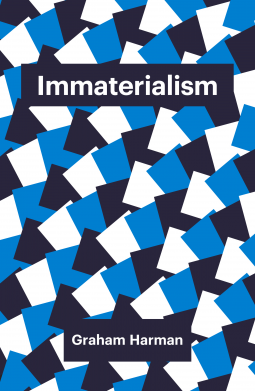
Immaterialism
Objects and Social Theory
by Graham Harman
This title was previously available on NetGalley and is now archived.
Buy on Amazon
Buy on Bookshop.org
Buy on Waterstones
*This page contains affiliate links, so we may earn a small commission when you make a purchase through links on our site at no additional cost to you.
Send NetGalley books directly to your Kindle or Kindle app
1
To read on a Kindle or Kindle app, please add kindle@netgalley.com as an approved email address to receive files in your Amazon account. Click here for step-by-step instructions.
2
Also find your Kindle email address within your Amazon account, and enter it here.
Pub Date 27 Jun 2016 | Archive Date 10 Oct 2016
Description
In this book the founder of object-oriented philosophy deploys his model of objects in the context of social theory. In Part One he outlines an immaterialist method to counter the dual reduction linked to the two senses of materialism, which either decomposes entities into their constituent pieces or overdetermines them by way of their relations and effects. Special attention is paid to the virtues and vices of actor-network theory, with the conclusion that ANT needs more focus on the unity, autonomy, and stability of objects, not less as some theorists have proposed.
In Part Two the author makes a case study for an object-oriented social theory: the Dutch East India Company (or VOC ), wrongly belittled by the philosopher Leibniz as a mere aggregate rather than a genuine thing. The VOC qualifies for objecthood neither through what it is nor what it does , but through its irreducibility to either of these forms of knowledge. As with any object, the story of the VOC is not exhausted by what it did or might have done. The phases of its life are not demarcated primarily by dramatic incidents, but by moments of symbiosis, a term drawn from the biologist Lynn Margulis.
This book provides a counterpoint to the now ubiquitous social theories of constant change, holistic networks, performative identities, and the construction of things by human practice. It will appeal to anyone interested in cutting-edge debates in philosophy and social and cultural theory.
Graham Harman is Distinguished University Professor in Philosophy at the American University in Cairo, Egypt
UK Pub Date: 6/5/2016
UK Price: £9.99
In Part Two the author makes a case study for an object-oriented social theory: the Dutch East India Company (or VOC ), wrongly belittled by the philosopher Leibniz as a mere aggregate rather than a genuine thing. The VOC qualifies for objecthood neither through what it is nor what it does , but through its irreducibility to either of these forms of knowledge. As with any object, the story of the VOC is not exhausted by what it did or might have done. The phases of its life are not demarcated primarily by dramatic incidents, but by moments of symbiosis, a term drawn from the biologist Lynn Margulis.
This book provides a counterpoint to the now ubiquitous social theories of constant change, holistic networks, performative identities, and the construction of things by human practice. It will appeal to anyone interested in cutting-edge debates in philosophy and social and cultural theory.
Graham Harman is Distinguished University Professor in Philosophy at the American University in Cairo, Egypt
UK Pub Date: 6/5/2016
UK Price: £9.99
Advance Praise
Immaterialism is by far the best introduction to object-oriented ontology currently available. Combining stylistic clarity with scholarly confidence, Harman provides us with an arsenal of solid arguments for why objects is a matter of crucial concern also to social theory.
Bjørnar Olsen, The Arctic University of Norway
“With a unique and beguiling voice, Harman sets out a important critique of new materialism through clean logic, compelling examples, and powerful arguments. Harman’s ‘immaterialism’ provides some fascinating and novel solutions to many of the problems that ANT and new materialism theory pose for political theory, and has dramatically changed my own thinking. A book worth reading, and rereading.”
Mark B. Salter, University of Ottawa
Bjørnar Olsen, The Arctic University of Norway
“With a unique and beguiling voice, Harman sets out a important critique of new materialism through clean logic, compelling examples, and powerful arguments. Harman’s ‘immaterialism’ provides some fascinating and novel solutions to many of the problems that ANT and new materialism theory pose for political theory, and has dramatically changed my own thinking. A book worth reading, and rereading.”
Mark B. Salter, University of Ottawa
Available Editions
| EDITION | Other Format |
| ISBN | 9781509500970 |
| PRICE | $12.95 (USD) |



